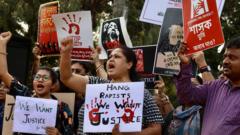The conviction of Sanjay Roy in the rape and murder of a Kolkata-based trainee doctor has reignited discussions on violence against women and healthcare workers in India, leading to widespread protests and demands for justice.
Conviction in Kolkata Doctor's Brutal Rape and Murder Triggers Outcry for Justice

Conviction in Kolkata Doctor's Brutal Rape and Murder Triggers Outcry for Justice
A man was found guilty in the harrowing case of a trainee doctor's rape and murder, prompting nationwide protests and calls for better security for healthcare workers.
In a landmark verdict, a man has been convicted in a highly publicized case involving the rape and murder of a trainee doctor at a Kolkata hospital, triggering a wave of national outrage and calls for reform in safety measures for healthcare professionals. Sanjay Roy, who volunteered at the hospital, was found guilty for the crime that occurred in August of the previous year, echoing deep concerns over women's safety in India’s medical institutions.
The case drew severe backlash from the public, leading to mass protests across the country, especially among medical students and professionals advocating for better protections. The judge, Anirban Das, indicated that Roy's sentencing would be significant, potentially including life imprisonment or the death penalty, with a final announcement expected shortly. Throughout the trial, Roy pleaded innocent, asserting that he was being framed.
The victim's family expressed that a lenient sentence would further erode confidence in India's legal system. The heartbreaking discovery of the 31-year-old doctor's body, found after a lengthy shift in the hospital's seminar hall, underscored the brutality of the crime. The post-mortem revealed signs of a struggle, leading investigators to determine that she had fought back against her assailant.
Initially under the jurisdiction of local police, the Central Bureau of Investigation (CBI) took over the case due to alleged mishandling, amplifying questions of accountability. Protests such as the "Reclaim the Night" march, which saw thousands of women taking to the streets, highlighted the urgent need for reform in security measures for women in all sectors, including healthcare.
In December, the victim's parents sought further investigation, expressing dissatisfaction with the CBI’s findings and calling for the involvement of additional suspects. With more than 31,000 reported rapes in India in 2022 alone, advocates stress that systemic issues surrounding sexual violence continue to hinder justice for victims and create an environment of fear, particularly for women.
The alarming rise in violent encounters within healthcare settings has also become evident, with surveys revealing a majority of doctors report experiencing aggression from patients or their relatives. The historic backdrop of similar cases, such as the 2012 Delhi gang rape case that incited widespread protests and changes in laws, indicates that public outcry can lead to crucial legal reforms, yet many challenges remain in combating gender-based violence across the nation.





















